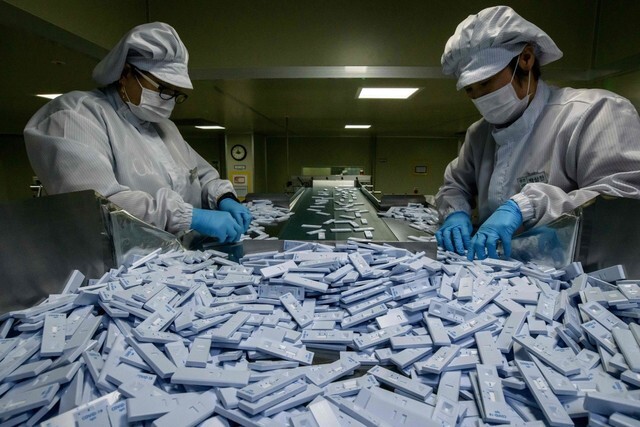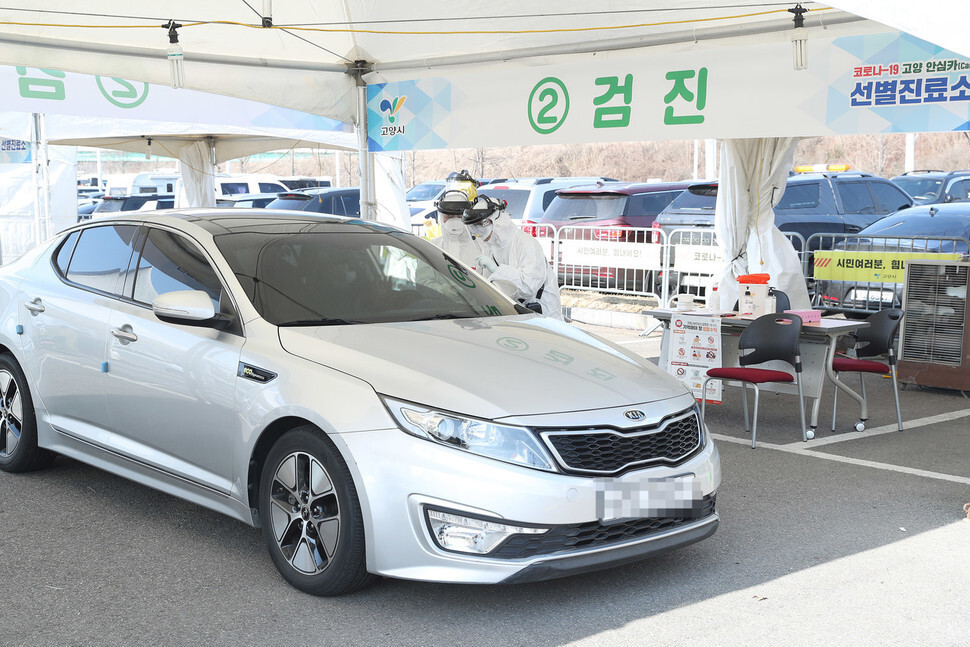hankyoreh
Links to other country sites 다른 나라 사이트 링크
S. Korea’s diagnostic kits to become international standard

South Korea is making great strides in its diagnostic technology for infectious diseases. Since its COVID-19 diagnostic kit gained recognition as an international standard, calls have been coming in from around the world for shipments of the kits. With some of the world’s leading countries struggling to fight the spread of the disease, South Korea’s supply of its diagnostic kits is helping to bolster the country’s diplomatic clout. This also gives a green light to South Korean medical equipment firms hoping to expand into the foreign market.
The Korean Agency for Technology and Standards (KATS), under South Korea’s Ministry of Trade, Industry, and Energy, and the Ministry of Food and Drug Safety announced on Mar. 29 that its DNA amplification testing method for detecting microorganisms and pathogens had been approved as a draft international standard (DIS) by the medical equipment technical committee of the International Organization for Standardization (ISO).
This draft standard provides a full definition of the procedures and methods of the nucleic acid amplification method of in vitro diagnostics, which can be used for diagnosing a variety of infectious diseases, such as COVID-19. This could serve as a standard for nucleic acid amplification tests, including the real-time DNA amplification testing that’s used in South Korea’s COVID-19 diagnostic kits. In the procedure for adopting international standards, the only remaining step is for the draft standard to receive final approval from all member states. Barring some unforeseen development, the technique will be adopted as an international standard before the end of the year.

This development is seen as quite significant, since it means that a diagnostic kit for infection diseases developed with South Korean technology will become established as a global standard. Government agencies such as KATS and the Ministry of Food and Drug Safety and companies in the medical equipment industry have been steadily working together over the past decade to develop diagnostic techniques.
“South Korea’s capacity for diagnosing COVID-19, a capacity that’s receiving attention from countries around the world, is grounded in the accuracy and reliability of our infectious disease diagnostic technology. The technical procedures that we’ve proposed are all being recognized even by international organizations staffed by experts from leading countries such as the US, Germany, and Japan,” said Chae Song-hwa, a researcher in biochemical service standards for the Ministry of Trade, Industry, and Energy.
Top countries that are suffering a crisis because of the spread of COVID-19 have been rushing to ask the South Korean government for diagnostic kits. South Korean Foreign Minister Kang Kyung-wha spoke on the phone with Indonesian Foreign Minister Retno Marsudi on the afternoon of Mar. 28, at Marsudi’s request. Marsudi asked for help, explaining that Indonesia was suffering a shortage of medical supplies, including diagnostic kids, amid the rapid spread of COVID-19. Kang responded by promising to provide “as much assistance as we can spare.” Indonesia is a key country for the New Southern Policy, a pillar of South Korean President Moon Jae-in’s foreign policy strategy.
So far, the governments of 81 countries have asked South Korea to provide COVID-19 diagnostic kits and other supplies for controlling the disease. The country count rises to 117 when the private sector is included. A plan for providing COVID-19 supplies is being discussed by a task force representing South Korean government agencies that are responsible for sending supplies overseas. After taking into account the public health needs of the country in question, the economic benefits and South Korea’s foreign policy, the team will carry out diplomatic cooperation through either commercial exports or foreign aid.
Top priority is US, given the two countries’ allianceThe top priority is the US, South Korea’s only ally. “US President Donald Trump himself has asked us [for diagnostic kits]. Since the US has agreed to a currency swap and has refrained from shutting the door to travelers from South Korea, in light of our alliance status, we need to take corresponding measures,” said an official from South Korea’s Ministry of Foreign Affairs (MOFA). MOFA said that COVID-19 diagnostic kits from three South Korean producers had recently received preliminary approval for emergency use from the US Food and Drug Administration.
The South Korean government has already agreed to actively supply diagnostic kits to the United Arab Emirates (UAE), a country that has been cooperating with South Korea in various areas, including nuclear power. Furthermore, Romania has already received two deliveries of South Korean protective gear and diagnostic kits on NATO airplanes. South Korea’s infectious disease diagnostic technology appears to be serving as a catalyst in boosting the country’s diplomatic credibility.
By Hong Dae-sun and Kim So-youn, staff reporters
Please direct comments or questions to [english@hani.co.kr]

Editorial・opinion
![[Column] Park Geun-hye déjà vu in Yoon Suk-yeol [Column] Park Geun-hye déjà vu in Yoon Suk-yeol](https://flexible.img.hani.co.kr/flexible/normal/500/300/imgdb/original/2024/0424/651713945113788.jpg) [Column] Park Geun-hye déjà vu in Yoon Suk-yeol
[Column] Park Geun-hye déjà vu in Yoon Suk-yeol![[Editorial] New weight of N. Korea’s nuclear threats makes dialogue all the more urgent [Editorial] New weight of N. Korea’s nuclear threats makes dialogue all the more urgent](https://flexible.img.hani.co.kr/flexible/normal/500/300/imgdb/original/2024/0424/7317139454662664.jpg) [Editorial] New weight of N. Korea’s nuclear threats makes dialogue all the more urgent
[Editorial] New weight of N. Korea’s nuclear threats makes dialogue all the more urgent- [Guest essay] The real reason Korea’s new right wants to dub Rhee a founding father
- [Column] ‘Choson’: Is it time we start referring to N. Korea in its own terms?
- [Editorial] Japan’s rewriting of history with Korea has gone too far
- [Column] The president’s questionable capacity for dialogue
- [Column] Are chaebol firms just pizza pies for families to divvy up as they please?
- [Column] Has Korea, too, crossed the Rubicon on China?
- [Correspondent’s column] In Japan’s alliance with US, echoes of its past alliances with UK
- [Editorial] Does Yoon think the Korean public is wrong?
Most viewed articles
- 1[Column] Park Geun-hye déjà vu in Yoon Suk-yeol
- 2Will NewJeans end up collateral damage in internal feud at K-pop juggernaut Hybe?
- 3N. Korean hackers breached 10 defense contractors in South for months, police say
- 4Why Korea shouldn’t welcome Japan’s newly beefed up defense cooperation with US
- 5[Guest essay] The real reason Korea’s new right wants to dub Rhee a founding father
- 6Thursday to mark start of resignations by senior doctors amid standoff with government
- 7[Editorial] New weight of N. Korea’s nuclear threats makes dialogue all the more urgent
- 8The dream K-drama boyfriend stealing hearts and screens in Japan
- 9Kim Jong-un expressed ‘satisfaction’ with nuclear counterstrike drill directed at South
- 10Terry Anderson, AP reporter who informed world of massacre in Gwangju, dies at 76